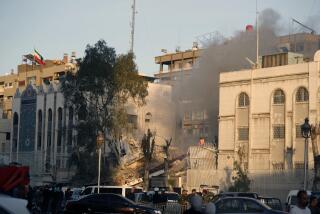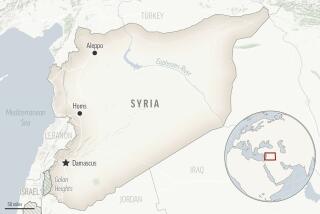Airstrikes against Islamic State in Syria stir anger among rebels
Opposition to U.S. airstrikes targeting Islamist militants in Syria appears to be growing among rebel groups and their backers in the country, threatening internal support for the Washington-led aerial offensive.
Since the strikes began last week, opposition activists have staged protests and denounced the U.S. air assault as misguided and an attack on Islam. Critics say the bombardment should be aimed at forces loyal to the government of President Bashar Assad, not his opponents.
“The coalition is against the blessed Syrian revolution, using the excuse of Daesh,” said a brigade commander with the U.S.-backed Free Syrian Army who goes by the nickname Abu Qusay. “Daesh” is the Arabic acronym for the militant group Islamic State.
“I personally won’t be allied with the West in a war against Islam,” Abu Qusay said via Skype from Idlib province.
U.S. officials seek to have what it calls the “moderate” Syrian opposition on board for its program of airstrikes against Islamic State, the Al Qaeda breakaway group formerly known as the Islamic State in Iraq and Syria, or ISIS. Instead, critics say the bombings may be having the unintended effect of increasing sympathy among various rebel factions, including U.S.-backed groups, for Islamic State and for Al Nusra Front, the official Al Qaeda franchise in Syria.
The U.S. bombing campaign could also result in the unintended consequence of reconciliation between the two groups. Washington has sought to isolate Islamic State from other Syrian rebels.
Drawing the ire of many in Syria is the fact that on the first day of airstrikes a week ago, at least one installation of Al Nusra Front was attacked outside the city of Aleppo. Several top Al Nusra Front operatives, including a master bomber and a celebrated sniper, were reportedly killed.
Al Nusra Front has widespread support in Syria among antigovernment activists and armed rebel factions. Despite its Al Qaeda affiliation, many view Al Nusra Front as a more homegrown movement than Islamic State, which is the main target of the U.S.-led strikes.
U.S. officials said the initial strikes were aimed at the Khorasan Group, described as a shadowy network of veteran Al Qaeda operatives working on potential attacks against the West. But many activists said that they had never heard of the Khorasan network and that the bombs seemed to target Al Nusra Front positions.
In a rare public speech Sunday, Abu Mohammed Jolani, the reclusive Al Nusra Front chief, predicted that the airstrikes will cause a “volcano” to erupt against the United States and Arab allies that participated.
“This is what will take the battle to the heart of your land, for the Muslims will not stand as an audience watching their sons bombed and killed,” Jolani said.
Al Nusra Front and Islamic State split in mid-2013 and have become bitter rivals. But “steps have already been taken for reconciliation between” them, said Ahmad Haskawi, the nom de guerre of an opposition activist contacted by Skype in the northeastern province of Hasakah.
Among other moves, he noted that Islamic State had released all of its Al Nusra Front prisoners in Raqqah, the north-central city that is regarded as its operations base. The Raqqah area has been a frequent target of U.S.-led airstrikes.
“We’ve also seen large numbers of people pledging allegiance” to Islamic State, the activist said, “not to mention entire fighting factions that have done so right after the bombing campaign began.”
The Syrian battlefield is extremely diverse; distinctions between many factions are blurred. Fighters frequently migrate from one group to another. Factions also regularly form alliances of convenience.
Many rebel fighters view the conflict as an Islamist revolt against an “apostate” government in Damascus led by Assad, a member of the Alawite sect, a Shiite Muslim offshoot regarded as heretical by many Sunni fundamentalists. Al Nusra Front has been a crucial ally for many armed factions, including bands fighting under the banner of the Free Syrian Army.
In its previous incarnation, Islamic State was also often a partner of various rebel groups, including U.S.-backed rebel fighters. The role of ISIS was regarded as key in one of the rebels’ signature victories: the takeover in August 2013 of the government’s Mannagh air base outside Aleppo. Attacks by a pair of ISIS suicide bombers kicked off the final thrust, which came after a siege lasting more than a year.
Across rebel-held stretches of Syria, many appear to agree with Al Nusra Front’s depiction of the aerial strikes as an attack on all Muslims.
“Nusra is a Syrian faction that is working on the ground, and only good has been seen from them,” said Abu Qusay, the Free Syrian Army brigade commander in Idlib.
It’s a popular sentiment among noncombatants as well, especially as reports mount of civilian casualties from the bombing campaign. Many have also complained of fuel shortages after the U.S.-led attacks targeted makeshift militant refineries.
Rami Abdul-Rahman, head of the British-based pro-opposition watchdog Syrian Observatory for Human Rights, alleges that the strikes have entered “the phase of targeting civilians under the excuse of attacking the Islamic State,” according to the French news channel France 24.
“There are question marks that must be raised to the leaders of the Syrian opposition that work with the coalition of Arab and international powers,” Abdul-Rahman told the news network. “Syrian citizens are a red line that cannot be crossed.”
Videos posted on the Internet last week show that in the Idlib town of Kafr Nabl, famous for its cleverly constructed media campaigns and placards backing the Syrian uprising, black-on-white Al Qaeda flags were prominently displayed among demonstrators. Residents were shown condemning the U.S.-led bombing campaign.
“I’d like to say that here we don’t have Nusra Front or anything else, we are all Sunnis, and they [the coalition] are fighting the Sunnis and the civilians,” one man said.
Bulos is a special correspondent.
Twitter: @mcdneville
More to Read
Start your day right
Sign up for Essential California for news, features and recommendations from the L.A. Times and beyond in your inbox six days a week.
You may occasionally receive promotional content from the Los Angeles Times.







